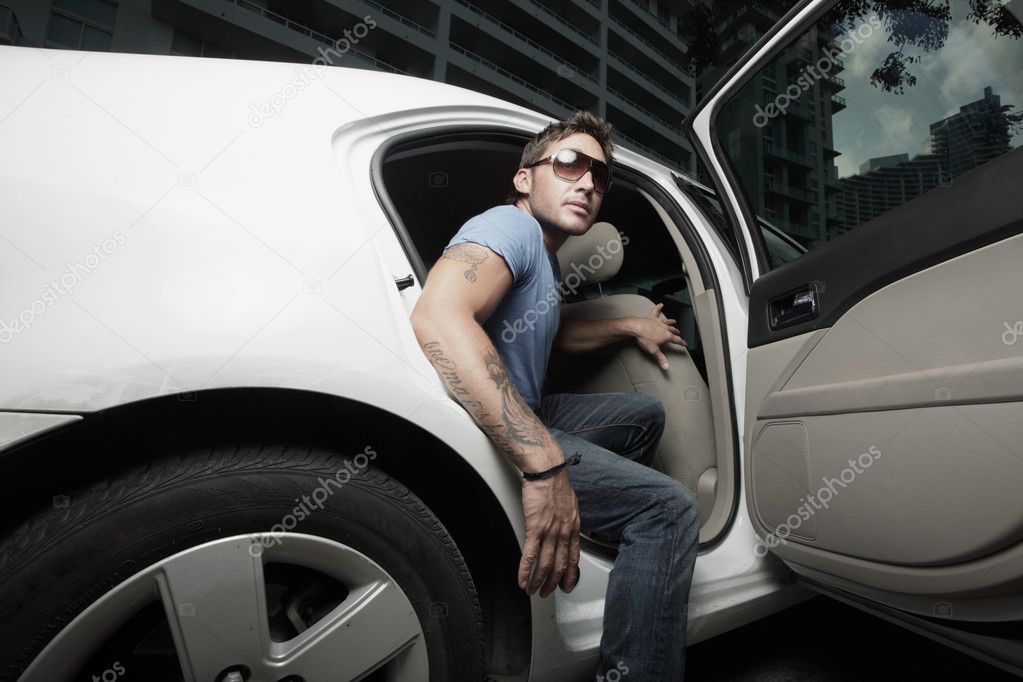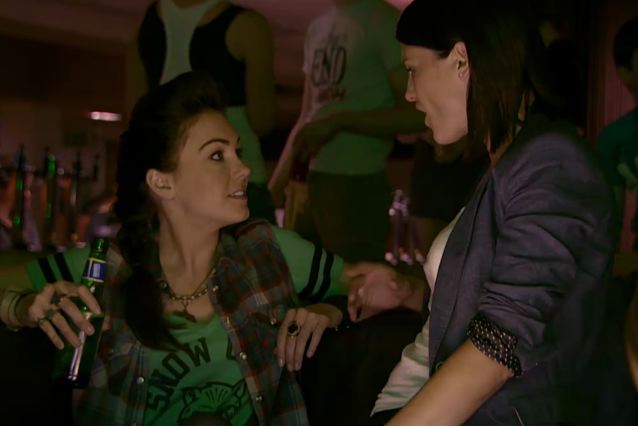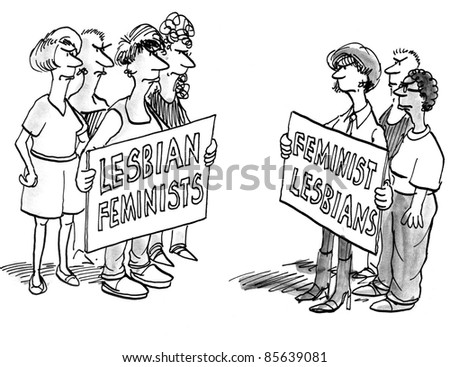What is street harassment, I hear you ask? It's catcalls, and compliments yelled from passing cars, whistles directed at 14 year old girls and 40 year old women alike. It's feeling nervous when walking down the hill from my school at night because of the one time there was a group of teen-aged boys leaning nonchalantly on the fence by the tennis courts. The inevitable hoots (and less inevitable but still depressingly common offers from passing drunks to be the man in a lesbian sandwich) when two women are seen holding hands in public. I could go on.
At its mildest, street harassment reminds me that I do not belong on the streets. Being told to smile, having the driver of a passing car yell out "nice tits," or "show us your map of Tasmania" (which is apparently a thing), or feeling the need to stare intensely at the pavement as I pass a construction site, reminds me that I am there on sufferance. It is not my place. It's the feeling that not even my body is mine.
 |
| The idea that any woman volunteers for this sort of treatment by wearing a low cut top or a sexy red dress has been shot down many times. |
Too many times, street harassment is also just plain scary. Fortunately for me, my experiences rank towards the lower end of normal; I've never seen a man jerk off while staring creepily at my face, or rub against me in a crowded train. One time I was riding my bike, just around the corner from my home in a suburban area, and a car full of young men slowed down behind me. [Its reflective of how we talk about street harassment that I initially described my outfit here]. I didn't look behind me at first, but when I reached the end of the road, where I had to turn right (across the traffic here in Australia), they were still there. When I stopped, waiting for them to pass me so I could turn, they stopped too. They called out to me, winding down the window, and the man in the front passenger seat opened his door and started putting his foot on the ground. I don't remember what they said, or their faces, but I remember his foot very clearly. I just bolted. I swung my bike round, cut in front of the car and started pedalling furiously for home.
 |
| "Man getting out of car" does not bring up masses of intimidating images, funnily enough. |
A week later, I had a similar, although less scary experience. I was on my way to uni, on my bike. I came to a stop in front of a set of traffic lights, where a line of cars were also waiting. As is my habit, I waited for the lights to change just in front of the leading car, and was off the minute the lights changed, my torso low to the handlebars and my legs pumping to accelerate quickly from a low-ish gear. The temptation proved too much for the driver and passengers of the white sedan which had been next to me at the lights, and they started cheering and hooting. I was so incensed I kept pace with them until I had to turn off onto a side road, trying to work out what I could yell back which would convey how unsafe and objectified they'd made me feel. I couldn't think of anything.
 |
| I bet she's tired of street harassment too. Interestingly, this image was illustrating a post on a conservative American blog about the rising price of petrol. |
A similar event happened in Lyon two weeks later. I was walking down the street, and a man smoking in a doorway called out to me. When I didn't respond to French, he switched to English and started walking beside me, asking me to go get a drink with him. I was clearly uncomfortable, and again kept moving and making minimal responses. He followed me to the train station where I was going to buy a ticket for a trip to Marseilles that weekend. I did not want him to know the details of my travel plans, so I gave him a phone number. My dad's Australian mobile number, without an area code. Maybe this was a bit of a bitchy thing to do, but just two weeks previously I'd felt very threatened by a man following me who would not take no for an answer, and I worried that if I said no this time, he would continue to bug me. Also: the fact that I DID feel threatened, should have been enough to make him back off, whether my feelings were justified or not.
So what hope is left in the world, now that men cannot hit on women in the streets?
 |
| This advice is nothing if not equal opportunity. |
To answer this question, I spent a long time looking for a blog post I remember reading last year, which was written in response to Rebecca Watson of Skepchick's story of feeling threatened by a man asking her up to his room after a short conversation in a hotel elevator, which went viral after Richard Dwarkins posted a highly demeaning and sexist response. I found a whole pile of other really interesting responses, but I think I was thinking about this blog post by PZ Meyers of Pharyngula about how Decent Human Beings hit on strangers. His point was that asking a woman up to your room for coffee in an elevator does not give a woman a graceful way to refuse and is insensitive to the legitimate anxiety she may have about being alone in an elevator with a man. In another post on the same topic he suggests that the sceptical reader google "elevator rape," and consider it is a moment where a woman is actually, physically, unable to get away. I am happy to take his word that the images are brutal and numerous. He suggests strategies like giving a woman your number rather than asking for hers, creating opportunities for her to gracefully decline and watching for her reaction, ready to back off if she looks nervous.
 |
| She looks to be having fun, even though her escape route is cut off. It all depends on context. Also, is anyone else freaked out by tanned-guy's hair? |
I have one good story to share: I was at an ice rink with some friends who'd come up with the crazy idea of going skating while in formal wear. One of the better skaters slid up next to me partway through the evening to say that I looked lovely. It was awkward, largely because he was obviously nervous, and skated away immediately, and because I'm bad at accepting compliments (I once completely cut the cute girl I'd been talking to all night when she asked for my number, because I was so shocked. Fortunately I got her number from a mutual friend once I'd had a chance to think about it and rectified the damage), but his compliment did not make me feel unsafe, or like an object. He didn't call out "nice tits" while racing past, or put me in a situation where I had no graceful exit. Copy this.
I believe this is a problem we can solve by talking about it loudly, please share your stories in the comments.
PS: I really can't say anything on this topic without linking to this article by Annika of Transgender Express at Autostraddle. It's a fascinating analysis of the male gaze, not least because Annika's life experiences have allowed her to see the phenomenon from both sides of the street.












